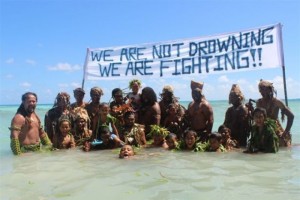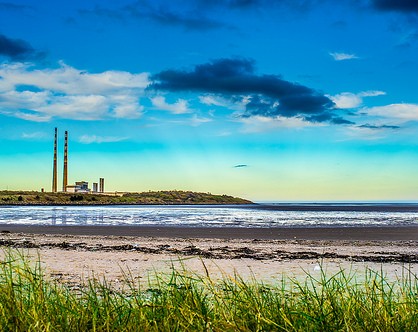Bri Cornish
Sabin Center Summer Intern & Rising 2L at Columbia Law School
On Monday, June 8th, leaders from small island nations around the South Pacific issued the “People’s Declaration for Climate Justice.” The declaration unites the island nations, which are particularly vulnerable to the calamitous impacts of climate change, against large international companies emitting greenhouse gases, declaring that they will seek “climate justice” by holding polluters accountable. The document opens with “We, the people” and lists the nations of Fiji, Kiribati, the Philippines, Solomon Islands, Tuvalu, and Vanuatu as signatories.

The Climate Justice declaration is not a standalone promise. It came in conjunction with Greenpeace Southeast Asia’s plan to request a formal investigation through the Philippines Commission on Human Rights on the possible human rights violations committed by big carbon polluters. At present, however, the declaration commences no real legal action. The declaration’s emphasis on accountability implies that the island nations may intend to bring suit. But how realistic is it that a group of tiny island nations could effectively seek compensation against polluting companies? Is it likely that these companies would be found liable for damages resulting from the consequences of their business practices across the world?
This exact debate surfaced following a round of UN climate talks in Doha, Qatar[1] three years ago. At that conference, delegates from nations recognized the real possibility of liability for “loss and damage” from climate change impacts in developing nations through informal “institutional arrangements” with developed nations. Nonetheless, some legal scholars continue to doubt the efficacy of both litigation and climate diplomacy stemming from human rights forums and declarations like the People’s Declaration for Climate Justice.
Yet the fact is that large, economically powerful multinational corporations have enjoyed substantial leverage in the international system to behave and act with little consequence when it comes to greenhouse gas pollution. One result is that smaller, less powerful nations and communities are drowning under rising sea levels and suffering more frequent and intense natural disasters. If we continue to ignore these realities we will usher in an era of environmental migrants, which will force us to reevaluate the laws governing control of population migration and employment.
The island nations’ action is not without precedent. After forming the Alliance of Small Island States (AOSIS) in 1990 to collectively lobby for climate change action on the international stage, islands in the region have become markedly more visible as repeated victims of rising sea levels and tropical storms. Furthermore, the number of individual actions to hold polluters and governments accountable continues to grow. In the Western Hemisphere, a Peruvian farmer plans to file a claim against the energy company RWE (one of the largest emitters of greenhouse gases) in German civil court, seeking compensation for the mounting threat of flooding from melting glaciers in a nearby lake caused by climate change. In April, a group of almost 1000 Dutch citizens filed suit against their government for failure to mitigate the impacts of climate change. The Hague District Court announced its decision on June 24th, ordering the Netherlands to reduce greenhouse gas emissions to 25% below 1990 levels by 2020. Belgium faces a similar lawsuit from its citizens.
The People’s Declaration for Climate Justice was announced on the same day as the G7[2] communiqué from Elmau, Germany declaring that G7 nations would reduce their fossil fuel dependency and decarbonize within the next century. The David and Goliath parallel between the two announcements is readily apparent. However decarbonizing is easier said, or declared, than done. Jeffrey Sachs laid out the following three steps as requirements toward the process of decarbonizing the global economy: (1) increasing energy efficiency, (2) investing in non-carbon energy and storing CO2 through carbon capture and storage (CCS), and (3) eliminating fossil fuel use by switching to hydrogen and biofuel sources. Each of these steps requires major shifts in production and manufacturing and will take decades to incorporate into business models.
All things considered, most environmentally aware citizens probably sympathize with the island nations. Lawyers would also be hard pressed to disagree that fossil fuel companies have contributed significantly to real and tangible harm to vulnerable island nation communities. The question remains whether international environmental law or international human rights law will allow for such claims or preclude litigation due to a number of procedural and substantive legal hurdles. Either way, the issue is unlikely to be resolved before the next Cyclone Pam, which devastated the island of Vanuatu this year, hits the region.
[1] The 2012 Doha Conference served as the 18th annual meeting of the Conference of the Parties (COP) to the 1992 UNFCCC as well as the 8th session of the Meeting of the Parties (MOP) of signatories to the 1997 Kyoto Protocol.
[2] The G7 is a group of developed nations that meet to discuss economic issues: The United States, Japan, Germany, United Kingdom, France, Italy, and Canada.



